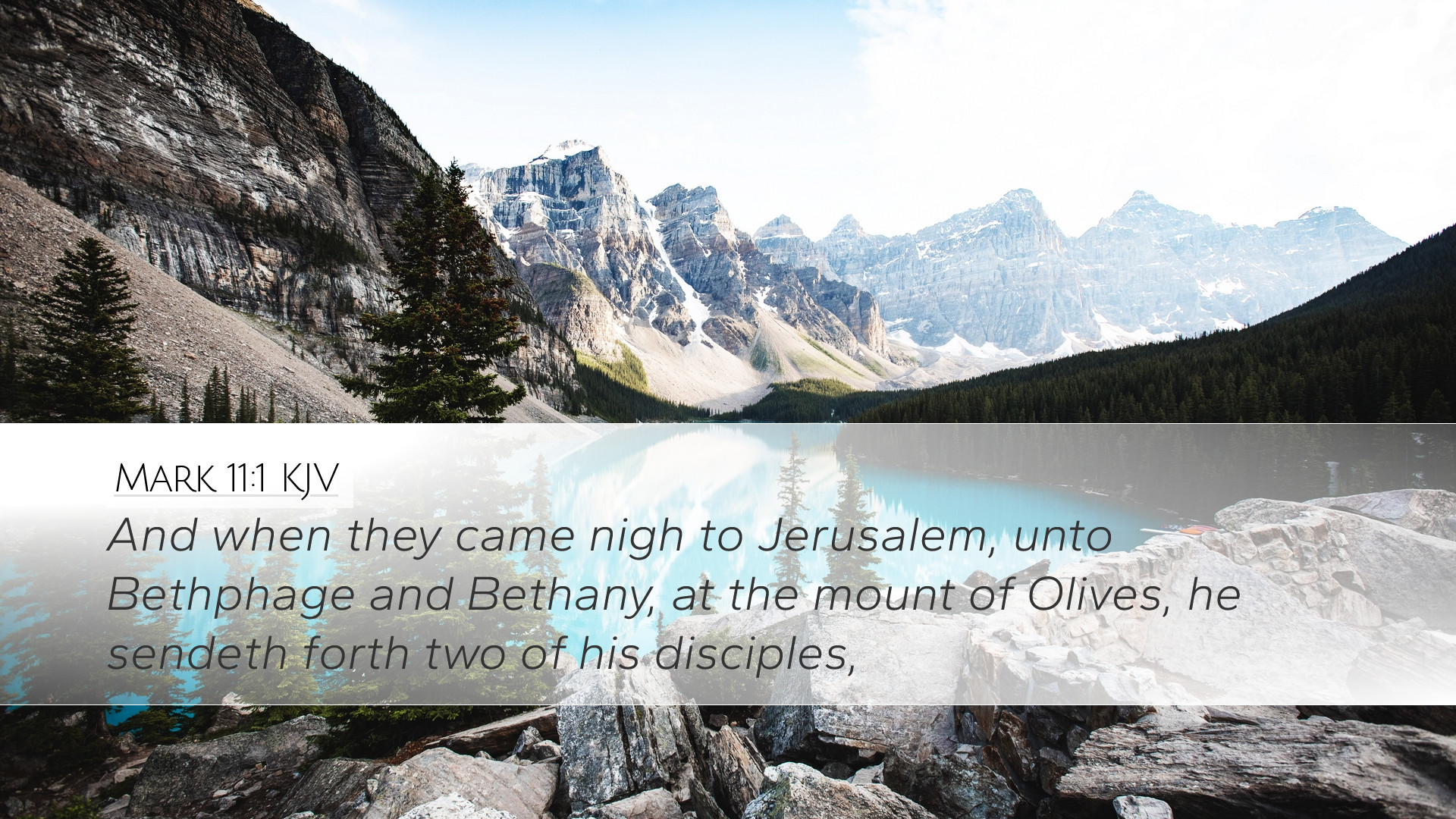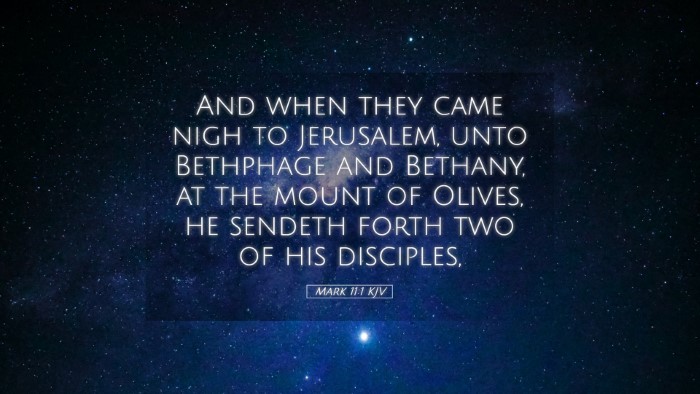Bible Commentary on Mark 11:1
Mark 11:1 (KJV): "And when they came nigh to Jerusalem, unto Bethpage and Bethany, at the mount of Olives, he sendeth forth two of his disciples."
Introduction
The passage of Mark 11:1 marks a significant moment in the Gospel narrative, setting the stage for the culmination of Jesus' earthly ministry. As He approaches Jerusalem, His actions and commands encompass deep theological significance and fulfillments of prophecy, providing rich insights for pastors, theologians, students, and scholars.
Contextual Analysis
To fully appreciate Mark 11:1, it is crucial to consider the geographical and historical context. Jesus is nearing the end of His ministry and the cross, as He travels towards Jerusalem, a city that is central to Jewish worship and the epicenter of religious authority.
- Location - Bethpage and Bethany: These towns are situated on the eastern slope of the Mount of Olives, intimately linked with the significant events in Jesus’ ministry and His final days. Bethany, the home of Lazarus, underscores the power of resurrection and divine authority that Jesus demonstrated, while Bethpage is often interpreted as a "house of unripe figs," symbolizing both spiritual fruitfulness and judgment.
- Mount of Olives: This location holds prophetic and eschatological significance in the Jewish tradition, as it connects with the prophecies concerning the coming Messiah and is associated with pivotal moments in Jerusalem's history.
Commentary Insights
Matthew Henry's Commentary
Henry emphasizes the obedience of the disciples in fulfilling Jesus' command. He points out that Jesus' instructions demonstrate His divine authority and foreknowledge, knowing precisely what would occur. The act of sending two disciples reflects both the specificity of Christ’s plans and the trust He places in His followers.
Albert Barnes' Notes
Barnes focuses on the significance of Jesus’ entry into Jerusalem, interpreting it as the fulfillment of prophecies regarding the Messiah. He highlights that Jesus’ approach is marked by humility—arriving on a colt signifies His role as the humble King, contrasting the expectations of a royal conqueror.
Adam Clarke's Commentary
Clarke expounds on the symbolic elements within Mark 11:1, particularly the selection of a colt. He suggests that this act not only reflects Jesus’ humility but also serves as a stark rejection of worldly power and authority. The choice of transport—the colt of an ass—furthers the notion of Jesus presenting a peaceful kingdom in contrast to the aggressive ambitions of earthly rulers.
Theological Themes
- Fulfillment of Prophecy: Mark 11:1 alludes to Zechariah 9:9, which proclaims the coming of a humble king. The actions of Jesus are a deliberate fulfillment, asserting His identity as the promised Messiah.
- Divine Sovereignty: The narrative underscores Christ's sovereignty over the unfolding events. His ability to command the disciples and the colt reveals His divine authority, encouraging themes of faith and obedience for followers of Christ.
- Discipleship and Obedience: The sending of the two disciples illustrates the call to action that discipleship entails. Their readiness to follow Jesus’ commands, even in seemingly mundane tasks, reflects the essence of true discipleship.
Applications for Modern Readers
In analyzing Mark 11:1, contemporary readers—including pastors, theologians, and students—can extract vital lessons applicable to today’s context:
- Understanding Our Role: Believers are called to respond obediently to Christ’s commission, recognizing that all tasks, great or small, are significant in God's kingdom.
- Messiah’s Humility: Reflecting on Christ’s humble entry, pastors can emphasize the importance of humility in leadership and ministry, contrasting it with contemporary trends of seeking power or status.
- Hope in Fulfillment of Promises: The narrative encourages believers to trust in God's promises and timing, recognizing that His plans often unfold in ways contrary to human expectations.
Conclusion
Mark 11:1 stands as a profound text rich with theological implications and practical applications. The insights drawn from public domain commentaries by Matthew Henry, Albert Barnes, and Adam Clarke provide a comprehensive understanding of the passage. The theme of obedience to Christ, His divine authority, and the humble nature of His kingdom are essential for anyone studying this significant moment in the life of Jesus.


